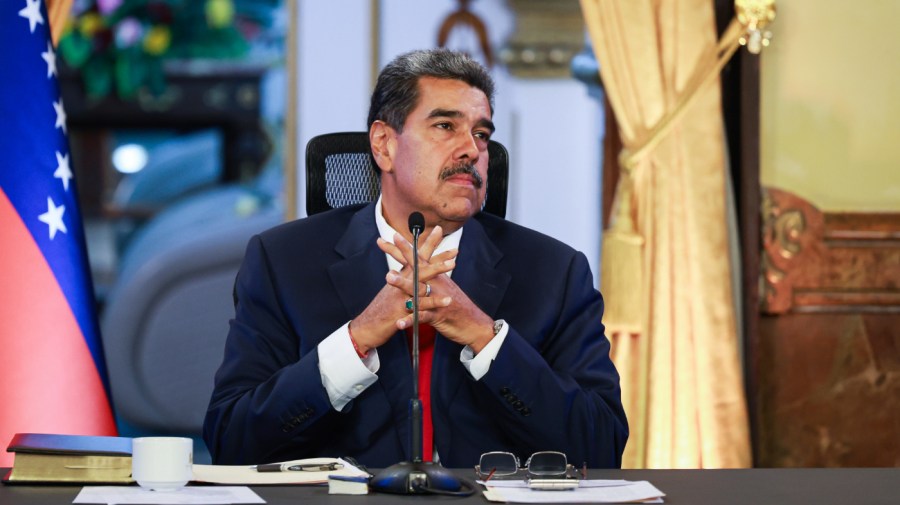
When dictatorships collapse, global shock waves ensue. Recall early in 2010, when Arab and African dictators and military strongmen seemed happily entrenched in power, only to collapse like dominoes after the dismantling of the regime of Tunisian president Zine El Abidine Ben Ali.
In today’s interconnected world of autocrats, the collapse of the Syrian regime could catalyze a similar dismantling of other dictatorships, leaving a wake of chaos, hope and uncertainty.
The swift fall of the Syrian dictator Bashar Assad is a lesson on the fragility of alliances between autocrats.
When rebel forces encroached upon Damascus on Dec. 6 from the north and the south, Assad watched helplessly as his closest allies and patrons — Iran and Russia — withdrew their forces. Even Assad’s own military fled. Nobody imagined the 50-year-old Assad family dynasty would be crushed within a matter of weeks, leaving the dictator isolated and betrayed.
Could the Venezuelan regime of Nicolas Maduro, longtime Assad ally and honorary member of Iran’s “axis of resistance,” be the next to fall? Indeed, Assad’s defeat points to Maduro’s growing weakness and isolation. While kleptocrats form overt alliances and quid pro quos with other criminal states, their friendships are much shallower than the optics portray.
Unlike the Cold War era, when dictatorships were united by a common ideology, today’s autocrats share only a common enemy — the global international rules-based order that would put a halt to their criminal, repression-fueled operations. The brutal Maduro regime, despite its brazen election steal last summer and its vicious crackdown against opposition, is weaker than ever.
First, the loss of Syria means the loss of a key component of Maduro’s nexus of criminal connections. Francisco Santos Calderon, former ambassador of Colombia to the United States, explains the significance of Assad’s fall for three Latin American dictators, including Maduro, in his recent opinion column: “The foundation upon which their dictatorships were built has been severely weakened,” he writes.
In the case of Venezuela, that foundation includes numerous illicit groups connecting Venezuela with Iran through Hezbollah, Iran’s proxy terrorist organization. A 2020 Atlantic Council report identified a complex network of criminal clans embedded within Venezuela, providing “intelligence, training, funds, weapons, supplies and know-how to both the Maduro and Assad regimes.”
Maduro’s role involved harboring Hezbollah training cells deep inside Venezuela and providing safe transport of drugs and cash via Syria, to fund Hezbollah. In return, Maduro enjoyed robust Iranian security support and weapons.
Without Damascus, the crucial Iran-Syria-Caracas transport corridor, Maduro’s leverage with Iran is diminished. And Iran, weakened by its war with Israel and in retreat to reassess military priorities, is unlikely to provide military cover for Venezuela.
Putin’s abandonment of Syria is also striking. Russia has been a crucial patron to Venezuela for several decades, providing it with military funding. A significant portion of the funds was dedicated to maintaining the privileges of Venezuela’s military elite. Russian intelligence and disinformation technology have also served as an important weapon to harass, obfuscate, quell and track Maduro’s opposition.
But Putin’s recent abandonment of his longtime ally Assad demonstrates his capacity for betrayal. Furthermore, since the start of the full-scale Russian invasion of Ukraine in 2022, Russia’s military has been severely diminished.
“At some point in the second half of 2025, Russia will face severe shortages in several categories of weapons,” Foreign Policy predicted. It’s hard to imagine in its weakened state that Russia will continue to back Maduro. And without continuing support from his most treasured patrons, Maduro is ever more isolated on the international stage.
Perhaps the most important sign of Maduro’s weakness is the presence of an indefatigable, unified and organized opposition movement. Gene Sharp, an expert on dismantling dictatorships through non-violent resistance, believed the most effective way to oust a dictator was with resistance from within.
“The degree of liberty or tyranny in any government is in large degree a reflection of the relative determination of the subjects to be free and their willingness and ability to resist efforts to enslave them,” he wrote in “From Dictatorship to Democracy.”
The Venezuelan opposition, once bitterly divided, is now unified under an indefatigable leader — Maria Corina Machado. Machado insists that Maduro’s government is about to fall, instilling hope in Venezuela’s beleaguered populace — a miraculous feat amid widespread economic devastation and persecution. She urges unwavering support of the exiled and persecuted president-elect, Edmundo Gonzalez Urrutia, whose term should begin tomorrow, on Jan. 10.
The stakes are high; thousands of protesters have been killed or injured by security forces. Opposition party leaders remain under siege by regime forces as they shelter in the Argentine embassy.
Now is the precise time for the world to ramp up pressure on Nicolas Maduro to accept defeat and liberate Venezuela from tyranny. Such a prospect shines a beacon of hope on the entire hemisphere.
Kristina Foltz is a Rotary Scholar who writes about Colombian affairs.












